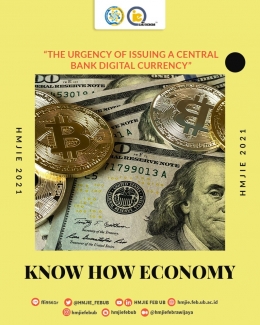The application of CBDC certainly cannot be separated from several discussions about the challenges and risks. There are a number of challenges and risks that need to be mitigated when CBDC is seriously applied in the community. The role of commercial bank intermediation may gradually disappear and there will be disintermediation in the financial system. Although the application of the CBDC hybrid model will not eliminate the role of commercial banks as a whole, there are several impacts that can disrupt a country's banking and financial systems, one of which is a decrease in third-party funds.
In addition, the application of CBDC can change people's behavior in shifting the allocation of funds from commercial banks to the central bank. If there is financial instability in a country, This can lead to massive withdrawals of funds (bank runs) from commercial banks and have an impact on liquidity in the banking sector. As a result, the banking sector can affect a country's financial and economic system. A decrease in loan funds from banks to the public can result in reduced financing for all economic sectors.
On the other hand, CBDC can lead to a phenomenon called currency substitution or digital dollarization. Currency substitution is a phenomenon when a resident in a country prefers to use foreign exchange rates to support his domestic transaction activities. This can occur due to the nature of the CBDC which supports cross border payments. Cross-border transactions can indeed be new opportunities and facilitate transaction activities between countries. However, this can pose a threat to countries that have a fundamentally weak monetary and economic system. When a country has a high level of volatility in the value of inflation and its exchange rate, this encourages currency substitution.
This phenomenon can be exemplified through the phenomenon of dollarization in Venezuela. The decline in the buying power of the Bolivar with other currencies, resulted in a decrease in the value of the currency's confidence and safety in the community. As a result, the public chose to replace the domestic exchange rate with a foreign exchange rate which was considered more stable, in this case USD. If we return to the CBDC case, the existence of CBDC can even encourage the occurrence of this phenomenon, market players can be motivated to replace their preferences for media transactions with certain currencies that are considered to have a better level of stability and security. the public chooses to replace the domestic exchange rate with a foreign exchange rate which is considered more stable, in this case USD.
On the other hand, infrastructure readiness and community digital literacy are important references when the CBDC implementation is actually carried out. Currently the government has a big responsibility in the process of equitable development throughout Indonesia. This unpreparedness, both infrastructure and literacy, can lead to a widening inequality in development in society. Thus the impact of implementing CBDC itself will be deemed ineffective and will have an impact on wasteful financing in the implementation process.
- CBDC IN ISLAMIC PERSPECTIVE
As we know, Indonesia is a country with the largest Muslim population in the world, therefore it is better if we discuss the problems and responses of Islam to CBDC as reference material for the future development of CBDC in Indonesia. The definition of money in Islam is as a determinant of the value of an item and a medium of exchange that can be used in various transactions, money itself must meet two conditions, namely first, psychological requirements, namely that money must be able to satisfy the various desires of the person who owns it so that all people want to acknowledge and accept it.
Second, technical requirements are the conditions attached to money, including durable and not easily damaged, easy to divide without reducing value, easy to carry, relatively stable value, not excessive in quantity, and consists of various noun values. It should be remembered that in Islam money is not a commodity that is traded directly and acts as a tool in a contract and it is haram to use money as a commodity for profit.
Then what about CBDC? Is it appropriate and acceptable as a currency in Islamic law? In contrast to traditional digital currencies which do not have fixed assets as guarantor and tend to be unstable, CBDC is a system controlled by the government and and its value is guaranteed by the government, therefore we can conclude that the government determines and recognizes a cryptocurrency as currency. It is lawful for its citizens and can be used as a medium of exchange. But it needs to be remembered here that as a currency the CBDC will also be subject to laws on the use of traditional money in Islam, among which the most common is its designation as ribaiyyah goods and various other laws in accordance with the Qur'an and as-Sunnah.
REFERENCES
Arner, D., Auer, R., & Frost, J. (2020). Stablecoins: risks, . Bank for International Settlements.
Bank for International Settlements. (2020). Central bank digital currencies: foundational principles and core features. Bank for International Settlements.







